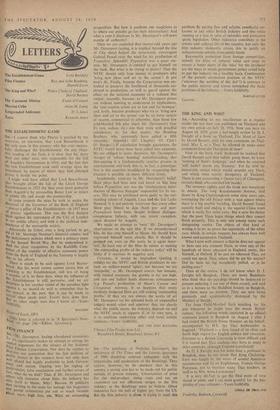SIR.--The petulance of Nicholas Davenport, the unfairness of The Times
and the fatuous ignorance of MPs doubtless contrast unhappily with the impartiality and moderation of the Boultings. They appear, however, to be unaware that in this country a strong case has to be made out for public subsidy of private industry. Uncertainties of price for the end-product, rising costs and tax on customers are not afflictions unique to the film industry as the Boultings seem to believe. Other industries face the pull of higher pay from the US. But the film industry is alone in trying to meet this problem by paying fees and salaries practically un- known in any other British industry and this while running at a loss in spite of subsidies and protective quota legislation. Other industries contribute to the artistic and cultural life of .the country, but only the film industry insistently claims this to justify an indiscriminate subsidy from public funds.
Reasonable protection from foreign competition, subsidy for films of cultural value and steps to ensure a better share of the 'take' for the producer are the ways in which government policy could help to put the industry on a healthy basis. Continuation of the present anomalous position of the NFFC ('whatever the wording of the Act' !) is contrary to the public interest and leaves untouched the basic problems of the industry.—Yours faithfully, Lucerne
HAROLD LEV lilt














































 Previous page
Previous page